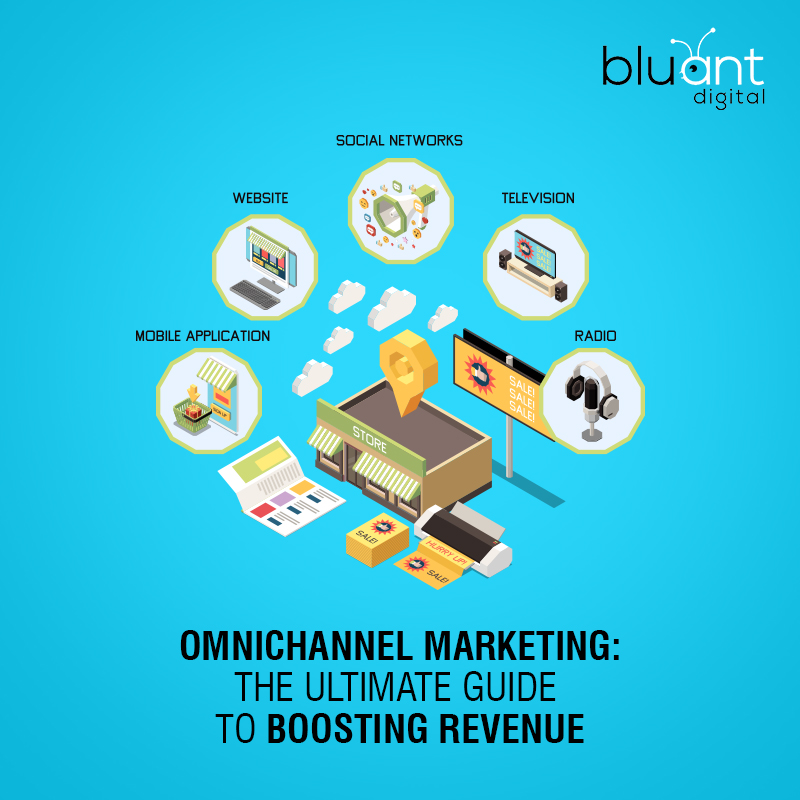
How Omnichannel Marketing Can Boost Your Revenue: A Guide for Businesses
Today’s customers are more connected than ever before. They use multiple devices and channels to research, shop, and buy products and services. This means that businesses need to adopt an omnichannel marketing approach to reach their customers and achieve their goals. To meet the needs of these omnichannel shoppers, businesses need to adopt an omnichannel marketing strategy.
What is Omnichannel Marketing?
Omnichannel marketing is a customer-centric approach to marketing that seeks to provide a seamless and unified brand experience across all channels, both online and offline. This means that customers should be able to interact with the brand in a consistent and convenient way, regardless of whether they are browsing the website, shopping in a store, or using the app.
Omnichannel marketing is the integration of all channels, delivering a unified and consistent brand experience across physical stores, apps, websites, and more. It ensures customers can seamlessly interact with the brand across different platforms, enhancing their overall brand experience.

Here are some of the most common channels of omnichannel marketing:
Online channels:
- Website
- App
- Social media
- SMS
- Pay-per-click (PPC) advertising
- Search engine optimization (SEO)
- Display advertising
- Affiliate marketing
Offline channels:
- Retail stores
- Call centers
- Direct mail
- Events
- Public relations
Other channels:
- Smart speakers
- Chatbots
- Virtual assistants
- Wearable devices
Businesses can use a variety of these channels to reach their target audience and create a seamless customer experience. Omnichannel marketing can be complex to implement, but it can be very effective in driving sales and improving customer satisfaction. By providing a consistent experience across all channels, businesses can make it easier for customers to find and purchase their products or services.
Here are some examples of Omnichannel Marketing:
- A customer sees a product they like on a brand’s social media page. They click on the link to the brand’s website to learn more about the product. Once they’re ready to purchase, they add the product to their cart and checkout using their saved shipping information.
- A customer receives an email from a brand with a coupon code for a product they’ve wanted to buy. They click on the link in the email to go to the brand’s website and add the product to their cart. They use the coupon code to get a discount on their purchase.
- A customer browses a product on a brand’s website and saves it to their cart. Later, they go to a physical store to try on the product and ask questions about it. They decide to purchase the product in-store and use their saved cart to quickly and easily checkout.
Adopting an omnichannel marketing approach can lead to a more satisfying customer experience, and increased engagement, and ultimately contribute to revenue growth by fostering customer loyalty and facilitating more efficient and targeted marketing efforts. To get benefits from a business with omnichannel, you need to:
- Understand your customers: What channels do they use? How do they interact with your brand? What are their needs and expectations? Once you have a good understanding of your customers, you can start to develop an omnichannel strategy that meets their needs.
- Integrate your channels: This means making it easy for customers to switch between channels and have a consistent experience across the board. For example, customers should be able to start their shopping process online and then finish it in-store, or vice versa.
- Personalize the customer experience: Omnichannel gives you the opportunity to collect data about your customers from multiple channels. Use this data to personalize their experience by offering them relevant products and services, and by providing them with the support they need.
- Measure your results: It’s important to track the results of your omnichannel strategy so you can see what’s working and what’s not. This will help you to refine your strategy over time.
Omnichannel marketing is beneficial for generating ROI. In fact, it is essential for businesses that want to succeed in today’s digital world. Omnichannel marketing allows businesses to create a seamless and personalized experience for customers across all channels, both online and offline. This leads to increased customer engagement, loyalty, and lifetime value. There are a number of ways that omnichannel marketing can help businesses to generate ROI.
Benefits of Omnichannel Marketing
- Improved customer experience: Omnichannel marketing provides customers with a seamless experience across all channels. This means that customers can start their journey on one channel and finish it on another, without any disruption. This can lead to increased customer satisfaction and loyalty.
- Increased sales and revenue: Omnichannel marketing can help businesses increase sales and revenue in a number of ways. For example, businesses can use omnichannel marketing to:
- Increase conversion rates by providing customers with a seamless shopping experience across all channels.
- Reduce cart abandonment by reminding customers about their abandoned carts and offering them incentives to complete their purchases.
- Cross-sell and upsell products by recommending complementary products to customers based on their purchase history and browsing behavior.
- Reduced costs: Omnichannel can help businesses to reduce costs by streamlining operations and improving inventory management.
- Better customer insights: Omnichannel gives businesses a more complete view of their customers. This information can be used to improve marketing campaigns, product development, and customer service.
- Increased customer engagement: Omnichannel marketing allows businesses to engage with their customers in more meaningful ways. For example, businesses can use social media to build relationships with customers, email marketing to send personalized offers, and in-store promotions to encourage repeat purchases.
- Increased customer lifetime value: Omnichannel marketing helps you build stronger relationships with your customers by providing them with a more personalized experience. This can lead to increased customer lifetime value, as customers are more likely to continue buying from brands that they feel a connection with.
Role of an advertising agency for omnichannel marketing
Ad agencies can use a combination of traditional and digital omnichannel marketing strategies to create a customized marketing plan that meets your specific business goals and budget. By working with an ad agency, you can be confident that you’re using the right channels and strategies to reach your target audience and achieve your business goals.
Benefits of hiring an advertising agency for omnichannel marketing:
- Expertise: Ad agencies have a team of experts with a wide range of skills in all aspects of omnichannel marketing, from strategy and creative development to execution and measurement. This means that you can be confident that your campaigns are in good hands.
- Resources: Ad agencies have access to the latest tools and technologies, as well as a network of partners and resources that can help you reach your target audience more effectively.
- Time and cost savings: Hiring an ad agency can save you time and money in the long run. Instead of having to build and manage your own marketing team, you can focus on your core business activities.
How an ad agency uses omnichannel marketing for business growth for better ROI:
Omnichannel marketing is a customer-centric approach that integrates all of your marketing channels to create a seamless experience for your customers. Ad agencies can use omnichannel marketing in both traditional and digital ways to help you grow your business and achieve better ROI.
Traditional omnichannel marketing:
- Direct mail: Ad agencies can help you develop and execute targeted direct mail campaigns that reach your ideal customers.
- Print advertising: Ad agencies can create and place print ads in newspapers, magazines, and other publications that your target audience reads.
- Outdoor advertising: Ad agencies can help you design and place outdoor ads, such as billboards, bus benches, and transit ads, in high-traffic locations.
- TV and radio advertising: Ad agencies can develop and produce TV and radio commercials that reach your target audience when and where they’re most likely to see and hear them.
Digital omnichannel marketing:
- Search engine optimization (SEO): Ad agencies can help you optimize your website and content for search engines so that your website appears higher in search results.
- Pay-per-click (PPC) advertising: Ad agencies can help you create and manage PPC campaigns that drive traffic to your website and generate leads and sales.
- Social media marketing: Ad agencies can help you develop and execute social media marketing campaigns that engage your target audience and promote your brand.
- Content marketing: Ad agencies can help you create and distribute high-quality content that attracts and engages your target audience.
- Email marketing: Ad agencies can help you develop and execute email marketing campaigns that nurture your leads and customers.
Here are a few examples of how ad agencies can use omnichannel marketing to help businesses grow:
- A retail store could use a combination of direct mail, email marketing, and social media marketing to promote a new sale. The store could send direct mail postcards to customers in their zip code, send email coupons to existing customers, and promote the sale on social media.
- A restaurant could use a combination of print advertising, online advertising, and social media marketing to attract new customers. The restaurant could place print ads in local newspapers and magazines, run online ads on search engines and social media platforms, and post photos and videos of their food on social media.
- A software company could use a combination of content marketing, email marketing, and social media marketing to generate leads and sales. The company could create and publish blog posts, white papers, and other educational content on its website, send email newsletters to subscribers, and promote its content on social media.
Conclusion
Omnichannel marketing is a powerful tool that the best advertising agencies in Kolkata can use to boost revenue. By providing a consistent and seamless experience for their customers across all channels, the agencies can attract new customers, increase customer engagement, improve customer satisfaction, and increase revenue.

